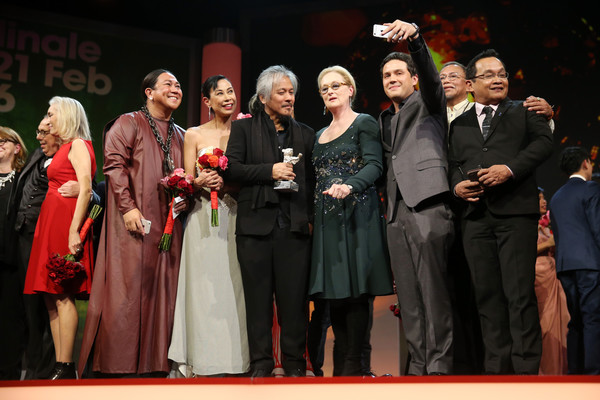
The Berlinale officially closes today. Although we’re not yet finished with our coverage – a couple of interviews still to come – it’s the perfect time to look back and discuss the festival’s awards. In my review of Gianfranco Rosi’s exquisite new film, Fire at Sea, I noted that it would be a shock for the film to leave the Berlinale empty-handed. Lo and behold, the festival’s jury, headed by Meryl Streep, agreed with the sentiment, and rightly awarded the competition’s best film with the Golden Bear.
The festival’s unofficial theme – repeated across press releases and around the festival hub – was refugees and immigrants. Much as Rosi’s impressive constructed, morally compelling and profoundly moving film might have benefited from that, however, it was hard to ignore the fact that its reception by critics and audiences simply towered above any other film playing in any program in Berlin. The theory among critics was that if another film were to win, it would be Mia Hansen-Løve’s L’Avenir would be it. With critics near-unanimously calling it the director’s best work yet, and with four women on a jury of seven, the Isabel Huppert vehicle was likely to find favour, and indeed it nabbed the best director prize. [More...]
 Meryl with winners at Berlinale
Meryl with winners at Berlinale
 Trina Dyrholm & Ulrich Thomsen in "The Commune"
Trina Dyrholm & Ulrich Thomsen in "The Commune"
Huppert would have been a shoe-in for best actress had the festival’s rulebook not prevented the jury from awarding a film more than once. Instead, the award was given to Trine Dyrholm for The Commune. Hers is a fine performance and about the only authentic element of Thomas Vinterberg’s otherwise charmless comedy, though it lacks the depth of Huppert’s work, or the emotional potency of Julia Jentsch’s work in the German abortion drama, 24 Weeks.
For the best actor prize, it really seemed like the jury had nowhere to look but the first film that screened here, Tunisia’s Hedi. Majd Mastoura’s subtly evolving performance is a marvel that carries the film on its shoulders and unquestionably the best male performance in contention, and Streep’s jury wouldn’t have minded rewarding the only African film in competition after her controversial comment in the festival’s opening ceremony.
The biggest surprise of the night was the winner of the Jury Grand Prize – effectively the festival’s second highest honor – which went to Danis Tanović’s rather tepid political allegory, Death in Sarajevo. No one seemed particularly excited about the film, a predictable, monotonous imagining of a hotel in the titular city as a metaphor for Bosnia and Herzegovina, but the jury were clearly more impressed. Even more unexpectedly, the film also bagged the FRPRESCI prize. Tanović’s win meant that André Téchiné’s delightful Being 17 was completely shunned, given that it also missed out on the screenplay prize, which was given to Tomasz Wasilewski for United States of Love. The latter film, from Poland, was the only competition title I missed at the festival.
 Crosscurrent
Crosscurrent
The technical prize for contribution to cinematography was award to Mark Lee Ping Bin for the Chinese film Crosscurrent which, though by no means one of the popular films at the festival, was unanimously praised for its photography. Meanwhile, at the expense of the formally daring, playful Iranian film, A Dragon Arrives!, the Alfred Bauer prize for a film that “opens new perspectives on cinematic art” was given to Lav Diaz’s horrendous A Lullaby to the Sorrowful Mystery. The Filipino director’s film is longer than 8 hours, a fact in which the director clearly takes masturbatory pleasure, though there is no narrative or formal justification for this excruciatingly tedious, artless and repetitious study of the Philippines’s history. Quite what about the film opens a new perspective on cinematic art is unknown to me, but I’ll give the jury the benefit of the doubt and assume that the mere duration of the film didn’t tip them in considering it “daring.”
Finally, a note about two of my favourite films that I didn’t review, which played out of competition: Robert Greene’s Kate Plays Christine and Maya Kosa and Sergio da Costa’s Rio Corgo. Both films play with the boundary between fiction and documentary filmmaking. Greene’s follow-up to Actress focuses on Kate Lyn Sheil as she prepares to portray Christine Chubbuck for a film within the film. Consistently playing with the audience’s expectations of truth and reality, Greene’s film is, without exaggeration, one of the most creative biopics ever put on screen and features a sensational performance from Sheil. Rio Corgo, on the other hand, is a charming, droll meditation on aging and solitude in rural Portugal from a filmmaking duo whose short but promising career is definitely one to watch.
 Kate Plays Christine
Kate Plays Christine
As mentioned earlier, there will be a couple of more pieces in the coming week – an interview with Mani Haghighi, the director of A Dragon Arrives!, and another one with the filmmaker behind the Scandinavian horror film, Shelley – but for now, I’ll leave you with a list of my favourites from the festival, see the full winners list at Berlinale's official site.
Amir’s Berlin Top 10:
1. Fire at Sea (Rosi)
2. Kate Plays Christine (Greene)
3. Rio Corgo (Kosa/da Costa)
4. L’Avenir (Hansen-Løve)
5. A Dragon Arrives! (Haghighi)
6. Being 17 (Téchiné)
7. Midnight Special (Nichols)
8. Hedi (Ben Attia)
9. Tales of Two who Dreamt (Bussman/Pereda)
10. Starless Dreams (Oskouei)